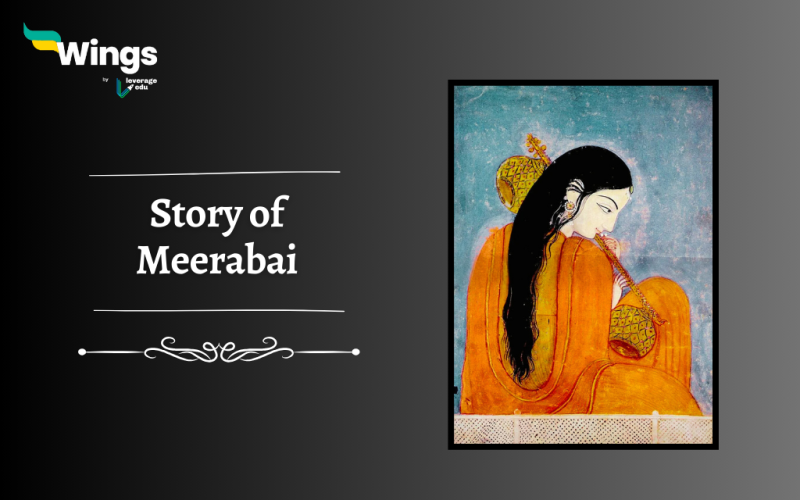Meerabai also known as Meera was an important women poetess, saint and devotee in the Bhakti movement of India during the 16th century. Although not much is known about her, but her deep devotion to Lord Krishna and her literary contributions have made her a celebrated figure in Indian history and culture. In this blog post, we will explore the life, work and contributions of this remarkable saint through a series of concise points.
Table of Contents
Life of Meerabai
- Meerabai was born in the year 1498 in the town of Merta in Rajasthan, India.
- She was born into the royal family of Merta, the daughter of Ratan Singh, the ruler of Merta.
- Her grandfather Rao Duda, was a staunch follower of Lord Krishna. Thus, from a young age, Meerabai showed a deep interest in spirituality and a longing for divine connection.
- Born a princess, she was destined to marry into a royal family.
- At the age of 14, she was married to Prince Rana Kumbha alias Bhoj Raj of Mewar in the year 1516. However, she considered her marriage a worldly affair and herself to be a spouse of Lord Krishna.
- Her husband died in a battle in the year 1521, and thereafter she was the victim of various persecutions by her In-Laws.
- She mentions the two attempts of conspiracy of her murder through her poetry.
Also Read – Saint Surdas: Life, Works, Quotes and Contribution
“पायो जी म्हें तो राम रतन धन पायो “
“पग घूँघरू बाँध मीरा नाची रे “
“प्रभु कब रे मिलोगे “
“हरि तुम हरो जन की भीर “
“मेरो दरद न जाणै कोय “
Meerabai’s Work and Contribution
Her philosophy was to express devotion and love with God through worldly relations like – a friend for a friend, a mother’s love for her children or a woman for her beloved. Meerabai’s expertise lies in her ability to express the depths of her emotions and spiritual experiences through her poetry.
Bhajans (Devotional Songs):
- With a soul soaked in love for Krishna, Meerabai expressed her emotions through soul-stirring bhajans (devotional songs).
- Her compositions speak of divine love, longing for union with the beloved and the bliss of surrender in poetic verses.
Compositions:
- Meerabai’s compositions have been collected in her magnum opus, “Meerabai Padavali,” a compilation of over 1,300 bhajans.
- Her verses are recorded in the Rajasthani language. Her poem is also mentioned in “Prem Ambodh Pothi”, which is a literature written by Guru Gobind Singh.
- In Sikhism, Meerabai is considered one of the 16th historic Bhakti saints.
It is believed she had written letters to Tusidas to guide her in her path of devotion and was also a friend of the mystic saint Sant Raidas.
Also Read – Narsinh Mehta: Life, Work and Contribution
How did Meerabai Die?
After facing the treacherous attempts by her in-laws Meerabai left the palace and wandered in various pilgrimages. She was amazed by the idol of Ranchordasji and eventually settled in Dwarka. There are many folklores present with various versions of how she merged within the idol.
One of the famous folklore is – Her in-laws came to ask her permission to come back but she declined their request. On the day of Janmashtami, she stayed in the temple and at night miraculously merged inside the idol of her beloved Lord. While some believe she slipped away in disguise. Since then, she was nowhere to be found.

Meerabai’s Influence
As a devotee of Lord Krishna, she immersed herself in Bhakti yoga, the path of devotion, and sought union with the divine.
- Various films like “A Few Things I Know About Her” by Indian film director Anjali Panjabi, Meera by Gulzar and Sadhvi Meerabai, etc were dedicated to the poetess.
- A magnificent museum “Meera Mahal” located in the heart of Merta displays the life of Meerabai in paintings, sculptures and a garden that is also dedicated to her name.
- Meera was a symbol of passion, pain, suffering and dedication.
Through her life and works, Meerabai continues to inspire generations of devotees to develop a deeper connection with the divine. Her devotion to Lord Krishna expressed through her soulful poetry, can be referred to as a guiding light for individuals seeking a deeper connection with the divine. Meerabai’s contributions to the Bhakti movement and her role as a spiritual luminary make her a revered figure in Indian history.
Relevant Blogs
| Saint Ramanujacharya | Adi Shankaracharya |
| Chaitanya Mahaprabhu | Sufi Movement |
| Vedanta Philosophy | Saint Nimbarka |
| Saint Kabir Das | Gautam Buddha |
That’s all about Meerabai! If you want to know more about topics like this, then visit our general knowledge page! Alternatively, you can also read our blog on general knowledge for competitive exams!
 One app for all your study abroad needs
One app for all your study abroad needs













